Here is one fast 64bits function to do it, please comment the return line you don't need. Accepting any valid Ipv4 with or without valid CIDR Routing Prefix for example 63.161.156.0/24 or 63.161.156.0
<?php
function cidr2range($ipv4){
if ($ip=strpos($ipv4,'/'))
{$n_ip=(1<<(32-substr($ipv4,1+$ip)))-1; $ip_dec=ip2long(substr($ipv4,0,$ip)); }
else
{$n_ip=0; $ip_dec=ip2long($ipv4); }
$ip_min=$ip_dec&~$n_ip;
$ip_max=$ip_min+$n_ip;
#Array(2) of Decimal Values Range
return [$ip_min,$ip_max];
#Array(2) of Ipv4 Human Readable Range
return [long2ip($ip_min),long2ip($ip_max)];
#Array(2) of Ipv4 and Subnet Range
return [long2ip($ip_min),long2ip(~$n_ip)];
#Array(2) of Ipv4 and Wildcard Bits
return [long2ip($ip_min),long2ip($n_ip)];
#Integer Number of Ipv4 in Range
return ++$n_ip;
}
To fast check if a given ipv4 is matching a given CIDR you can do it inline like in this example
<?php
$given_cidr='55.55.55.0/24';
$given_ipv4='55.55.55.55';
if(($range=cidr2range($given_cidr)) &&
($check=ip2long($given_ipv4))!==false &&
$check>=$range[0] && $check<=$range[1])
{
echo 'Yes, '.$given_ipv4.' is included in '.$given_cidr;
}
else
{
echo 'No, '.$given_ipv4.' is not included in '.$given_cidr;
}
To get the full range as an array for a given IP (with or without CIDR Routing Prefix) you can use the following code but be carefull because for example 25.25.25.25/16 return an array with 65536 elements and you can easily run out of memory using a smaller Routing Prefix
<?php
$result=cidr2range($ipv4);
for($ip_dec=$result[0];$ip_dec<=$result[1];$ip_dec++)
$full_range[$ip_dec]=long2ip($ip_dec);
print_r($full_range);
To fast check if a given ipv4 is matching a given array of IP (with or without CIDR Routing Prefix)
<?php
#This code is checking if a given ip belongs to googlebot
$given_ipv4='74.125.61.208';
$given_cidr_array=['108.59.93.43/32','108.59.93.40/31','108.59.93.44/30','108.59.93.32/29','108.59.93.48/28','108.59.93.0/27','108.59.93.64/26','108.59.93.192/26','108.59.92.192/27','108.59.92.128/26','108.59.92.96/27','108.59.92.0/27','108.59.94.208/29','108.59.94.192/28','108.59.94.240/28','108.59.94.128/26','108.59.94.16/29','108.59.94.0/28','108.59.94.32/27','108.59.94.64/26','108.59.95.0/24','108.59.88.0/22','108.59.81.0/27','108.59.80.0/24','108.59.82.0/23','108.59.84.0/22','108.170.217.128/28','108.170.217.160/27','108.170.217.192/26','108.170.217.0/25','108.170.216.0/24','108.170.218.0/23','108.170.220.0/22','108.170.208.0/21','108.170.192.0/20','108.170.224.0/19','108.177.0.0/17','104.132.0.0/14','104.154.0.0/15','104.196.0.0/14','107.167.160.0/19','107.178.192.0/18','125.17.82.112/30','125.16.7.72/30','74.125.0.0/16','72.14.192.0/18','77.109.131.208/28','77.67.50.32/27','66.102.0.0/20','66.227.77.144/29','66.249.64.0/19','67.148.177.136/29','64.124.98.104/29','64.71.148.240/29','64.68.64.64/26','64.68.80.0/20','64.41.221.192/28','64.41.146.208/28','64.9.224.0/19','64.233.160.0/19','65.171.1.144/28','65.170.13.0/28','65.167.144.64/28','65.220.13.0/24','65.216.183.0/24','70.32.132.0/23','70.32.128.0/22','70.32.136.0/21','70.32.144.0/20','85.182.250.128/26','85.182.250.0/25','80.239.168.192/26','80.149.20.0/25','61.246.224.136/30','61.246.190.124/30','63.237.119.112/29','63.226.245.56/29','63.158.137.224/29','63.166.17.128/25','63.161.156.0/24','63.88.22.0/23','41.206.188.128/26','12.234.149.240/29','12.216.80.0/24','8.34.217.24/29','8.34.217.0/28','8.34.217.32/27','8.34.217.64/26','8.34.217.128/25','8.34.216.0/24','8.34.218.0/23','8.34.220.0/22','8.34.208.128/29','8.34.208.144/28','8.34.208.160/27','8.34.208.192/26','8.34.208.0/25','8.34.209.0/24','8.34.210.0/23','8.34.212.0/22','8.35.195.128/28','8.35.195.160/27','8.35.195.192/26','8.35.195.0/25','8.35.194.0/24','8.35.192.0/23','8.35.196.0/22','8.35.200.0/21','8.8.8.0/24','8.8.4.0/24','8.6.48.0/21','4.3.2.0/24','23.236.48.0/20','23.251.128.0/19','216.239.32.0/19','216.252.220.0/22','216.136.145.128/27','216.33.229.160/29','216.33.229.144/29','216.34.7.176/28','216.58.192.0/19','216.109.75.80/28','216.74.130.48/28','216.74.153.0/27','217.118.234.96/28','208.46.199.160/29','208.44.48.240/29','208.21.209.0/28','208.184.125.240/28','209.185.108.128/25','209.85.128.0/17','213.200.103.128/26','213.200.99.192/26','213.155.151.128/26','199.192.112.224/29','199.192.112.192/27','199.192.112.128/26','199.192.112.0/25','199.192.113.176/28','199.192.113.128/27','199.192.113.192/26','199.192.113.0/25','199.192.115.80/28','199.192.115.96/27','199.192.115.0/28','199.192.115.128/25','199.192.114.192/26','199.192.114.0/25','199.223.232.0/21','198.108.100.192/28','195.16.45.144/29','192.104.160.0/23','192.158.28.0/22','192.178.0.0/15','206.160.135.240/28','207.223.160.0/20','203.222.167.144/28','173.255.125.72/29','173.255.125.80/28','173.255.125.96/27','173.255.125.0/27','173.255.125.128/25','173.255.124.240/29','173.255.124.232/29','173.255.124.192/27','173.255.124.128/29','173.255.124.144/28','173.255.124.160/27','173.255.124.48/29','173.255.124.32/28','173.255.124.0/27','173.255.124.64/26','173.255.126.0/23','173.255.122.128/26','173.255.122.64/26','173.255.123.0/24','173.255.121.128/26','173.255.121.0/25','173.255.120.0/24','173.255.117.32/27','173.255.117.64/26','173.255.117.128/25','173.255.116.192/27','173.255.116.128/26','173.255.116.0/25','173.255.118.0/23','173.255.112.0/22','173.194.0.0/16','172.102.8.0/21','172.253.0.0/16','172.217.0.0/16','162.216.148.0/22','162.222.176.0/21','180.87.33.64/26','128.177.109.0/26','128.177.119.128/25','128.177.163.0/25','130.211.0.0/16','142.250.0.0/15','146.148.0.0/17'];
echo '<pre>';
$in_range=false;
if (($given_ipv4_dec=ip2long($given_ipv4))!==false)
{
foreach($given_cidr_array as $given_cidr){
if(($range=cidr2range($given_cidr)) &&
$given_ipv4_dec>=$range[0] && $given_ipv4_dec<=$range[1])
{
$in_range=true;
echo $given_ipv4.' matched '.$given_cidr.' ('.join(array_map('long2ip',$range),' - ').")\n";
}
}
}
echo $given_ipv4.' is probably'.($in_range?'':' not').' a Googlebot IP';
To run fast the function don't check input but formally it should be a string matching the following regex
#^(?:((?:0)|(?:2(?:(?:[0-4][0-9])|(?:5[0-5])))|(?:1?[0-9]{1,2}))\.((?:0)|(?:2(?:(?:[0-4][0-9])|(?:5[0-5])))|(?:1?[0-9]{1,2}))\.((?:0)|(?:2(?:(?:[0-4][0-9])|(?:5[0-5])))|(?:1?[0-9]{1,2}))\.((?:0)|(?:2(?:(?:[0-4][0-9])|(?:5[0-5])))|(?:1?[0-9]{1,2}))(?:/((?:(?:0)|(?:3[0-2])|(?:[1-2]?[0-9]))))?)$#
If you want to verify the input before using the function
<?php
if (is_string($ipv4) && preg_match('#^(?:((?:0)|(?:2(?:(?:[0-4][0-9])|(?:5[0-5])))|(?:1?[0-9]{1,2}))\.((?:0)|(?:2(?:(?:[0-4][0-9])|(?:5[0-5])))|(?:1?[0-9]{1,2}))\.((?:0)|(?:2(?:(?:[0-4][0-9])|(?:5[0-5])))|(?:1?[0-9]{1,2}))\.((?:0)|(?:2(?:(?:[0-4][0-9])|(?:5[0-5])))|(?:1?[0-9]{1,2}))(?:/((?:(?:0)|(?:3[0-2])|(?:[1-2]?[0-9]))))?)$#',$ipv4))
{
#This is a valid ipv4 with or without CIDR Routing Prefix
$result=cidr2range($ipv4);
print_r($result);
}
Then the formal answer to your question is the following
<?php
#Requiring cidr2range shown above function
function cidr_match($mixed_ip,$mixed_cidr){
if (!is_array($mixed_ip)){
$string_mode=true;
$mixed_ip=[$mixed_ip=>0];
}
else $mixed_ip=array_fill_keys($mixed_ip,0);
if (!is_array($mixed_cidr)) $mixed_cidr=[$mixed_cidr];
foreach($mixed_ip as $ip => &$result)
foreach($mixed_cidr as $cidr)
{
if(($range=cidr2range($cidr)) &&
($check=ip2long($ip))!==false &&
$check>=$range[0] && $check<=$range[1]){
$result=$cidr;
break;
}
}
$mixed_ip=array_filter($mixed_ip);
return $string_mode?($mixed_ip?true:false):$mixed_ip;
}
print '<pre>';
#Your example
$ips = array('10.2.1.100', '10.2.1.101', '10.5.1.100', '1.2.3.4');
foreach ($ips as $IP) {
if (cidr_match($IP, '10.2.0.0/16') == true) {
print "you're in the 10.2 subnet\n";
}
}
#Also working with IP array and/or CIDR array
#If IP array is given then return an array containing IP (keys) matching CIDR (values)
$result=cidr_match($ips,['20.2.0.0/16','10.2.0.0/15']);
foreach($result as $ip => $cidr){
print "$ip is in the $cidr subnet\n";
}
You can compile your own function using these examples, hope these few lines have helped you…
